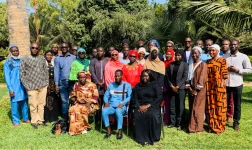The Gambia just held an important climate meeting on April 6, 2025. People gathered at the University of the Gambia to discuss gender and climate laws. They met at the National Climate Action Centre for a full day. This meeting built on talks from January, where they discussed how women can lead climate efforts and what problems they face. They also talked about ways to highlight female leaders and make budgets that help women.
Many important people came to the meeting. There were government officials, environmental groups, community project leaders, climate experts, and security staff from all over the country. They all wanted to help with climate action plans that work well for everyone. The MRV for Climate Action Programme organized everything. Canada gave $20 million to fund this program across four West African countries: The Gambia, Ghana, Liberia, and Togo.
Mrs Aji Rohey Bah-Leigh spoke about the National Environment Agency. She runs Environmental Policy at NEA and said her agency plays a huge role in fighting climate change. The NEA watches greenhouse gas levels through its ozone unit. It makes rules for many groups, including the government, private companies, and regular people. Her team recently created new rules about gases that harm the ozone layer and heat the planet.
She pointed out a big problem—very few women helped write these important rules. During the ozone regulation review, only two or three women participated. She explained that they work on the Kigali Implementation Plan and noticed that women rarely get asked for input. This leaves out many helpful ideas and experiences that could make the plans better for everyone.
Nenneh Touray from the Ministry of Gender called the research report perfect timing. She believes it can shape better policies by showing where gaps exist. She reminded everyone that women and children suffer most from climate problems yet rarely help make decisions. She stressed that women must lead climate action because many climate issues directly affect their daily lives. After the meeting, everyone approved the document with their comments to be added by Mrs. Tabu Njie Sarr before final submission.
Many important people came to the meeting. There were government officials, environmental groups, community project leaders, climate experts, and security staff from all over the country. They all wanted to help with climate action plans that work well for everyone. The MRV for Climate Action Programme organized everything. Canada gave $20 million to fund this program across four West African countries: The Gambia, Ghana, Liberia, and Togo.
Mrs Aji Rohey Bah-Leigh spoke about the National Environment Agency. She runs Environmental Policy at NEA and said her agency plays a huge role in fighting climate change. The NEA watches greenhouse gas levels through its ozone unit. It makes rules for many groups, including the government, private companies, and regular people. Her team recently created new rules about gases that harm the ozone layer and heat the planet.
She pointed out a big problem—very few women helped write these important rules. During the ozone regulation review, only two or three women participated. She explained that they work on the Kigali Implementation Plan and noticed that women rarely get asked for input. This leaves out many helpful ideas and experiences that could make the plans better for everyone.
Nenneh Touray from the Ministry of Gender called the research report perfect timing. She believes it can shape better policies by showing where gaps exist. She reminded everyone that women and children suffer most from climate problems yet rarely help make decisions. She stressed that women must lead climate action because many climate issues directly affect their daily lives. After the meeting, everyone approved the document with their comments to be added by Mrs. Tabu Njie Sarr before final submission.












